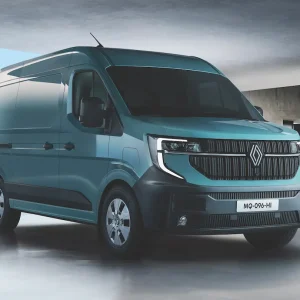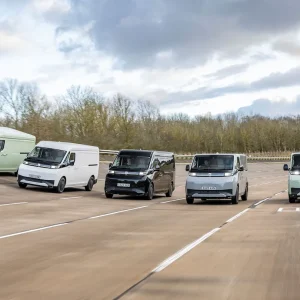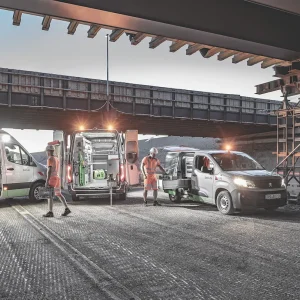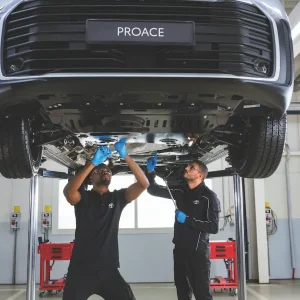It may seem like a bygone era now but less than a decade ago the idea that van operators would be happy to purchase stock online was treated with considerable scepticism.
Surely you had to see the vehicle in the metal to avoid ending up with a dented rust bucket with a knackered engine and soiled seats?
But with increased technological sophistication leading to the development of viewing systems such as BCA’s Video Appraisal service and Manheim’s Simulcast potential customers can check both the exterior and interior of vans in advance to determine condition and specification, resulting in growing confidence in remote buying with the bonus for operators of not having to take time out from their business to visit an auction hall.
Indeed Manheim staged what it claims to be the first exclusively online auction for LCVs in October 2014.
Hall and net
But Duncan Ward, BCA’s head of commercial vehicles, argues that the hybrid “Live Online” style of auction, where physical bidders in the hall compete against digital bidders is now “all dominant”.
Ward admits that because the virtual bidder does not have the luxury of physically inspecting the vehicles they bid on they must have confidence in the condition and the presentation of the lots.
“If they know the vehicle has been pre-sale prepared by BCA, this is a mark of quality that speaks for itself,” he says.
Ward adds that if buyers know LCVs have been accurately appraised, described and graded then they are more likely to bid – whether digitally or from within the auction hall.
He claims BCA has developed valuation, grading and imaging technology to enable buyers to make informed decisions and says the process for online customers is seamless; from the Auction View search engine to the Live Online and Bid Now and Buy Now sales channels.
In addition, BCA’s partnership with the AA on the BCA Assured 30-point mechanical check together with transparent post-sale dispute processes also builds confidence, according to Ward.
Rival auction house Manheim, meanwhile, offers zoom-view high definition imagery, condition reports and is piloting 360 degree turntable imaging.
Ward explains there is no disparity between internet and physical auction prices but says that because the web allows more buyers to participate, the increased exposure means more vans achieve their market potential value.
However, Manheim says its data shows that the average value for stock sold online is 17% higher than for sales conducted in the hall. Age and mileage is lower for internet deals – at 61 months and 79,000 miles compared to 65 months and 81,000 miles.
Ward does not believe there is any restriction to the type of LCVs that will sell online.
“BCA is selling every possible type of light commercial online from late year models, to fleet and lease vehicles, dealer part-exchange stock and even non-runners.”
He says the key is to provide accurate and transparent descriptions so that remote buyers feel they have all the information they need to make informed bidding decisions.
Manheim’s CV boss James Davis adds: “Everything has a value, online or in the lane.”
Davis describes the Simulcast remote auction tool Manheim launched in 2006 as a “game changer” that has led to one in three of the firm’s customers buying vans online.
“Simulcast has allowed a multitude of dealers to begin sourcing and stocking vans on their forecourts and to fulfil orders.” Davis says.
Although he expects the trend to grow, he notes that buyers play safe online, with most deals being for standard “vanilla” vehicles.
Simulcast has also facilitated proxy bids where a buyer enters a maximum bid price into the system. Either the ceiling is passed or, when under the ceiling, the bidder secures the van for less than their maximum offer.
Davis says in the year to July Manheim sold more than £26m worth of vans to internet buyers. He claims over half the vans offered for sale attract an online bid and predicts in the full-year 30% will sell on year.
“In 2006, the number of vans sold online was less than 1%,” he says.
“The growth has been phenomenal. In the last 12 months alone, we have launched six new online sales channels, or shop windows, that give buyers the flexibility to choose a purchasing method that suits them.
Internet-based motor auctioneer Autorola says the main benefit of online remarketing is a quicker stock turn.
It says the vans on its web portal range from one to two year old stock sourced from VW LCV dealers to six year old ex-public utility vehicles.
So long as the description is accurate and the entry accompanied by photographs, Jon Mitchell, UK sales director, claims customers are happy to purchase online.
Autorola’s customer service team checks the vehicles when stock is added to the portal to ensure there is no valuable information missing, or that the price isn’t too high or low.
“Buyers know there will be no surprises, Mitchell says, “if there is a rare occasion when the vehicle isn’t quite what the buyer expected, our customer services team will ensure they talk to both the seller and buyer, mediating until everybody is happy.
“Of the thousands of vehicles we sell each year, only a very small handful are returned to the buyer.”
Mitchell says LCV buyers like to have any damage to the vehicle detailed so that they can judge what price to offer, while calculating repair costs.
“Van buyers are more open-minded to buying stock with damage than car buyers are,” he says.
Autorola has 2000 registered buyers predominantly consisting of independent used van dealers with a sprinkling of franchised dealers. Its online hub holds around 2800 LCVs.
The firm reported a rise in average sales prices from £8910 to £10,958 between the first and second quarters of this year – a return to the levels reached in the third quarter of 2014.
Mileage fell to 26,198 in Q2 from 28,306 in Q1 while age remained at 29 months.
“We had fewer higher mileage fleet units for sale online than in Q1 and more nearly-new vans in excellent condition, offered direct from manufacturers, which was another main reason alongside falling mileage for the price increase,” explains Mitchell.
He says demand is particularly strong in the leisure sector where customers are snapping up used panel vans, particularly VW Transporters, to convert them into camper vans.
The valuers’ perspective
Ken Brown, the editor of Cap’s Red Book for LCV values, says there is a view in the industry that online buyers can afford to pay slightly more than auction hall customers for used vans because they do not have to incur the cost of attendance – including both the cost of getting to the venue and, for dealers, the cost of having to spend time away from their business.
The alternative to online trading, says Brown, would be to use a professional buyer but this would entail paying a buyer fee on top of the hammer price.
George Alexander, Glass’s Guide’s CV editor agrees that online prices are “typically higher” and asserts that medium panel vans and double cab pick-ups from the premium brands are the most popular choices for web-based buyers.
Brown adheres to BCA’s view that most buyers use both online and physical auction channels.
He reckons geographic factors play a part, for example if you live in Scotland you are likely to go to the Glasgow hall but shop online for stock further afield. Likewise if the sale catalogue is looking thin at your local auction you may opt to check internet sales instead.
Brown acknowledges that the main auction houses have gone to great lengths to provide the best possible descriptions of vehicles through video appraisals and photographs but maintains some buyers will still feel there is no substitute for walking around the van to hear how the engine sounds or whether there is any smoke, for example. He adds it can also be useful to see what vehicles are awaiting preparation for the next sale to get an indication of possible price fluctuations due to improved supply.
Alexander acknowledges that the auction houses provide a high level of support if quality issues do arise but maintains online buyers will generally avoid lots that require a great deal of work.
Did you know?
Autorola offers a fixed price delivery service for CVs up to 3.5 tonnes, anywhere in mainland Europe, for £149.
Franchised and independent dealers dominate online LCV purchases, according to Glass’s.
‘Hybrid’ auctions, consisting of both physical, hall-based and online bidders now dominate LCV sales, says BCA.
Online sales have increased from 1% to a predicted 30% since 2006, according to Manheim Remarketing





